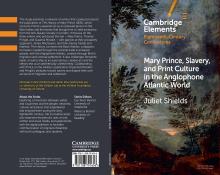This study examines a network of Romantic-era writers that coalesced around the publication of The History of Mary Prince (1831), which recounts Prince’s life as an enslaved person in the West Indies and the events that brought her to seek assistance from the Anti-Slavery Society in London. It focuses primarily on the three writers who produced the text--Mary Prince, Thomas Pringle, and Susanna Strickland Moodie—with glances at their most vocal pro-slavery opponent, James MacQueen, and their literary friends and relatives. The History constitutes a node connecting the Black Atlantic, a diasporic formation created through the colonial trade in enslaved people, with the Anglophone Atlantic, created through British migration and settlement. It also challenges Romantic ideals of authorship as an autonomous creative act and of the literary text as an aesthetically unified entity. Collaborating on the publication of Prince’s slave narrative not only impacted Strickland Moodie’s and Pringle’s attitudes towards slavery and racial difference, but also shaped the formal features of their accounts of migration and settlement in Upper Canada and South Africa respectively.
